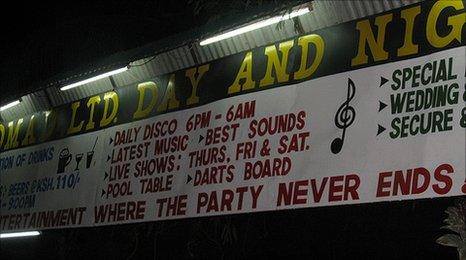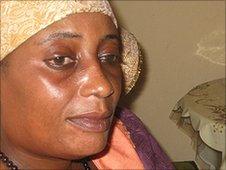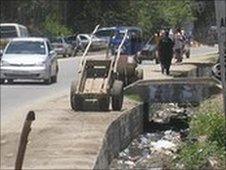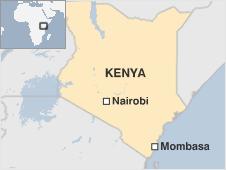Gay pride and prejudice in Kenya
- Published

Some are opposed to Mtwapa's relaxed attitudes
Ishmael, an openly gay Kenyan man living in the small coastal town of Mtwapa, just north of Mombasa, says that many gay men have come to live here, attracted by its open-minded and liberal atmosphere.
But this image of the town has been overshadowed by an increasingly vocal and mobilised anti-gay campaign which has been garnering local support.
This comes after similar moves in neighbouring Uganda and Malawi.
Human rights groups are warning that hardening attitudes to homosexuality in Africa are driving gays and lesbians underground.
Religions united
At Mtwapa's Masjid Answar Sunna Mosque Sheikh Ali Hussein tells around 300 worshippers that homosexuality is a "sin" which should be "punishable by death."

Esthe Kache is one of the politicians campaigning against homosexuality
Mr Hussein is head of an influential Kenyan organisation called the Council of Imams and Preachers.
He called a meeting after Friday prayers to talk more about homosexuality which was attended by local church leader Pastor Kenga Kahindi and around 100 locals.
The pastor agreed with the sheikh that the act was a sin but he said: "I don't think they should be killed, but removed from society" where he thinks some kind of rehabilitation of homosexuals could take place.
The anti-gay message brings together local Christians and Muslims, including Councillor Esthe Kache who is the local leader from the nearby town of Mnarani.
"In the Bible, it is not allowed at all and the Christians and Muslims around here, we are not going to allow such a thing," she says.
Cultural change
Ms Kache says that another big problem in the local area is HIV/Aids.
She looks after six Aids orphans in her own home and she highlights the good work of the Kenya Medical Research Institute (also known as Kemri) which conducts research and provides treatment and prevention advice to people with the virus.

Poverty is a real issue in Mtwapa
But Kemri's Mtwapa branch was targeted by an anti-gay mob on 13 February 2010 when a protest resulted in people being dragged out from the waiting room of the clinic and beaten.
Kemri conducts research on HIV/Aids among high-risk groups and works with male and female sex workers and men who have sex with men.
Mtwapa is developing fast, with a growing tourist industry bringing wealth and prosperity but some locals are afraid that it is taking them away from their traditions and culture.
Local resident Ali Salim, who works with drug addicts, is among those concerned about the changes.
"I see a lot of young girls and a lot of young men involved in commercial sexing."
He sees a link between a gay lifestyle and the growth in the male sex trade as he believes that gay men want to convert others and "grow their number".
Seductive politics
But Ishmael thinks it is a common misconception that homosexuality and prostitution are linked in some way.
"This is not true. Gay life is also about love and many gay men stick on one partner and that is it."
He was shocked when anti-gay feeling flared up in the town.
"For a long time, gay people have been coming into the area openly and going to their own bars and night clubs without problem," he says.
But the bars and clubs in Mtwapa have been upsetting some locals and have become a campaign issue in local elections.
Mufideh Mohammed is seeking to become a councillor and has been pushing the anti-gay message.
At a rally for women she spoke about the problem of homosexuality: "This has become the worst thing, we ask our women to protect our kids, especially boys."

One of those already in power locally is Kilifi district commissioner Kate Mwanza.
He wants Kenya to follow the lead of Uganda, where an MP has introduced a private member's bill which calls for homosexual acts to be punished by life in prison and the death sentence in some cases.
In Malawi, a gay couple was recently sentenced to 14 years in prison after holding an engagement party, although international pressure led to them being pardoned and freed.
"I believe we are going to review our laws to suit society's concerns," said Mr Mwanza.
The main concerns for people here are losing their cultural traditions and the arrival of HIV, drugs and prostitution.
The politicians' anti-gay campaign is seductive as it seems to address these fears, without really having to solve them.
You can listen to Nina Robinson's report on the BBC World Service's Assignment programme on Thursday 17 June.
- Published9 June 2010
- Published29 May 2010